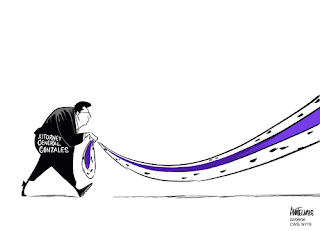The Internet has the potential to revitalize the role played by the people in our constitutional framework. It has extremely low entry barriers for individuals. It is the most interactive medium in history and the one with the greatest potential for connecting individuals to one another and to a universe of knowledge. It's a platform for pursuing the truth, and the decentralized creation and distribution of ideas, in the same way that markets are a decentralized mechanism for the creation and distribution of goods and services. It's a platform, in other words, for reason. But the Internet must be developed and protected, in the same way we develop and protect markets—through the establishment of fair rules of engagement and the exercise of the rule of law. The same ferocity that our Founders devoted to protect the freedom and independence of the press is now appropriate for our defense of the freedom of the Internet. The stakes are the same: the survival of our Republic. We must ensure that the Internet remains open and accessible to all citizens without any limitation on the ability of individuals to choose the content they wish regardless of the Internet service provider they use to connect to the Web. We cannot take this future for granted. We must be prepared to fight for it, because of the threat of corporate consolidation and control over the Internet marketplace of ideas.
The danger arises because there is, in most markets, a very small number of broadband network operators. These operators have the structural capacity to determine the way in which information is transmitted over the Internet and the speed with which it is delivered. And the present Internet network operators—principally large telephone and cable companies—have an economic incentive to extend their control over the physical infrastructure of the network to leverage control of Internet content. If they went about it in the wrong way, these companies could institute changes that have the effect of limiting the free flow of information over the Internet in a number of troubling ways.
The democratization of knowledge by the print medium brought the Enlightenment. Now, broadband interconnection is supporting decentralized processes that reinvigorate democracy. We can see it happening before our eyes: As a society, we are getting smarter. Networked democracy is taking hold. You can feel it. We the people—as Lincoln put it, "even we here"—are collectively still the key to the survival of America's democracy.
~ Al Gore: The Assault on Reason
Edited by WestTexasBliss
Al Gore - The Assault on Reason (Full Speech)
The danger arises because there is, in most markets, a very small number of broadband network operators. These operators have the structural capacity to determine the way in which information is transmitted over the Internet and the speed with which it is delivered. And the present Internet network operators—principally large telephone and cable companies—have an economic incentive to extend their control over the physical infrastructure of the network to leverage control of Internet content. If they went about it in the wrong way, these companies could institute changes that have the effect of limiting the free flow of information over the Internet in a number of troubling ways.
The democratization of knowledge by the print medium brought the Enlightenment. Now, broadband interconnection is supporting decentralized processes that reinvigorate democracy. We can see it happening before our eyes: As a society, we are getting smarter. Networked democracy is taking hold. You can feel it. We the people—as Lincoln put it, "even we here"—are collectively still the key to the survival of America's democracy.
~ Al Gore: The Assault on Reason
Edited by WestTexasBliss
Al Gore - The Assault on Reason (Full Speech)




 Praise Undermines Case for Dismissals
Praise Undermines Case for Dismissals


